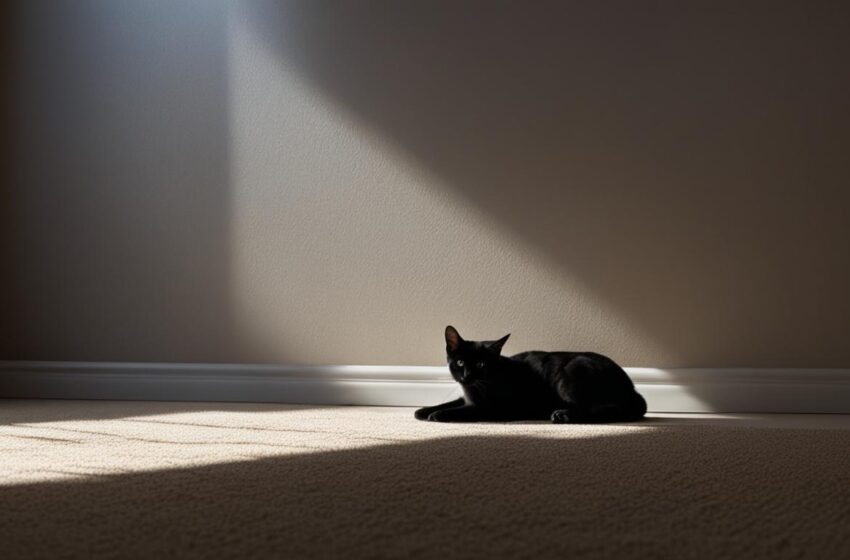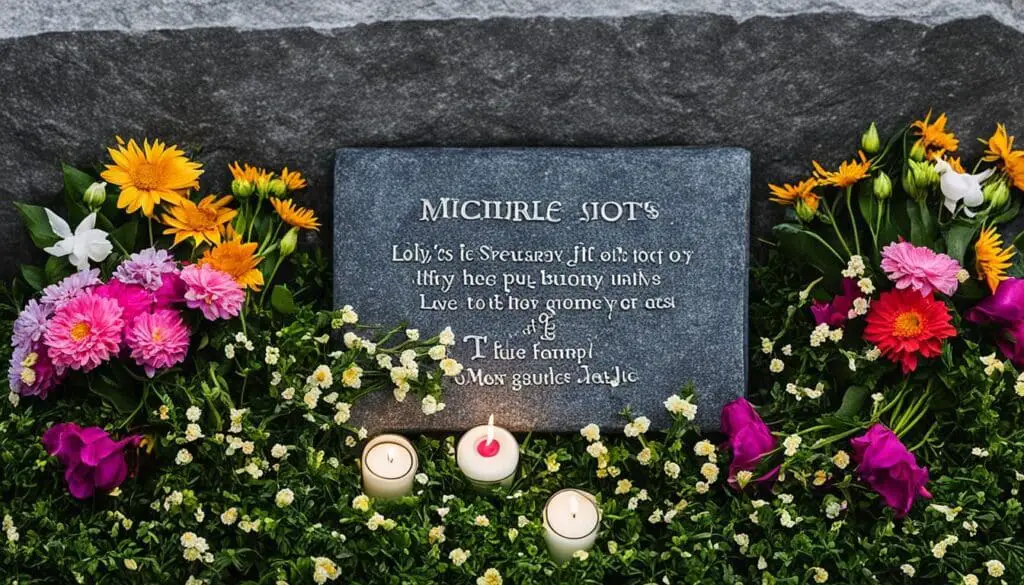Coping Strategies for the Loss of a Small Pet

Losing a small pet can be an incredibly challenging experience, one that brings about a wave of emotions and a profound sense of grief. As pet owners, we develop deep bonds and connections with our furry companions, making their loss all the more devastating. While the pain may feel insurmountable, there are coping strategies that can help us navigate this difficult journey of healing and finding solace.
In this article, I will explore various strategies for coping with the loss of a small pet, offering compassionate guidance and personal reflections. By understanding the grieving process, finding healthy outlets for emotional expression, honoring the life and memories of our beloved pets, seeking support from others, and considering professional help when needed, we can find strength and resilience in the face of grief.
Key Takeaways:
- Coping with the loss of a small pet is a deeply personal experience that requires compassion and understanding.
- Grieving is a natural and individual process, with no set timeline or stages that one must follow.
- Healthy outlets for emotional expression, such as talking to supportive friends or family, journaling, and engaging in creative activities, can aid in the healing process.
- Honoring the life and memories of our pets through meaningful tributes and rituals can bring comfort and a sense of closure.
- Seeking support from pet loss support groups, counseling, therapy, and online resources can provide solace and guidance during this difficult time.
Understanding Grief and Loss
The loss of a small pet can be an incredibly challenging experience, triggering a range of emotions and feelings of grief. Grieving is a natural and individual process, with each person coping with loss in their own unique way. It is important to remember that there is no right or wrong way to grieve, as everyone’s journey is different. Throughout this process, it is crucial to acknowledge and validate the emotions that arise, allowing oneself to mourn the loss of a beloved pet.
Grief often occurs in stages, although they may not be experienced in a linear fashion. The stages of grief, including denial, anger, bargaining, depression, and acceptance, are commonly observed but can vary from person to person. These stages are not necessarily experienced in a specific order and may overlap or occur multiple times during the grieving process. It is essential to recognize that this emotional journey is unique to each individual and to honor the time and space needed for healing.
“Grieving is like the ocean; it comes in waves, ebbing and flowing. Sometimes the water is calm, and sometimes it is overwhelming. All we can do is learn to swim.” – Vicki Harrison
Understanding the emotional impact of pet bereavement can help individuals navigate their grief. It is a process of acceptance and adjustment to the new reality without their companion. By acknowledging and allowing these feelings of grief, individuals can begin to heal and find solace in their own time.
Stages of Grief:
| Stage | Description |
|---|---|
| Denial | Avoiding the reality of the loss and feeling numb. |
| Anger | Feeling frustrated, resentful, or outraged about the loss. |
| Bargaining | Attempting to negotiate or make deals in hopes of reversing the loss. |
| Depression | Feeling deep sadness, loneliness, and withdrawal due to the loss. |
| Acceptance | Finding peace and understanding in the loss, embracing the reality. |
While grief and loss can feel overwhelming at times, it is important to remember that healing is possible. Through self-compassion, allowing oneself to grieve, and finding support, individuals can navigate the emotional impact of pet loss. Every person’s grief journey is unique, and by honoring their feelings and embracing their healing process, they can emerge stronger and find comfort in the cherished memories of their beloved small pet.
Expressing and Processing Emotions
During the grieving process, finding healthy outlets to express and process emotions is crucial for coping with the loss of a small pet. It is natural to experience a wide range of emotions such as sadness, anger, guilt, and even relief. By allowing ourselves to acknowledge and express these feelings, we can gradually heal and find a sense of peace.
Talking about the loss: Sharing our feelings and memories with understanding friends and family members can provide immense comfort and support. Engaging in open conversations about our small pet’s life and the impact they had on us allows us to process our emotions and reminisce about the joy they brought into our lives.
Journaling: Writing in a journal can be a powerful tool for emotional release and self-reflection. By putting our thoughts and emotions onto paper, we can gain clarity and understanding. Journaling allows us to express our innermost thoughts, fears, and regrets, enabling us to work through them and find solace in the process.

Engaging in creative outlets: Exploring creative activities provides a therapeutic outlet for our emotions. Whether it is painting, drawing, or crafting, expressing ourselves artistically allows us to tap into our innermost emotions and channel them into something tangible. Engaging in these creative endeavors can offer a sense of peace and serve as a form of self-expression.
“Art is a wound turned into light.” – Georges Braque
Ultimately, finding what works best for us as individuals is key to navigating the grieving process. Some may discover solace through talking with loved ones, while others may find it in exploring creative outlets or journaling. It is important to remember that there is no right or wrong way to grieve and heal from the loss of a small pet. Each person’s journey is unique, and it is crucial to honor our emotions and allow ourselves the time and space to heal.
Honoring the Life and Memories
When it comes to coping with the loss of a beloved small pet, finding ways to honor their life and memories can bring a sense of closure and comfort. Creating a pet memorial or tribute provides a meaningful way to celebrate the impact they had on our lives.
There are various ways to create a tribute for your pet. Consider planting a tree in their memory, symbolizing their continued presence in your life. This living memorial will serve as a lasting reminder of the joy they brought. You can also gather cherished photos and create a scrapbook, capturing precious moments that can be treasured forever.
Another heartfelt gesture is writing a letter to your pet, expressing your love, gratitude, and the memories you shared. Pouring your emotions onto paper can be cathartic and healing.
In addition, participating in remembrance rituals can be a powerful way to honor your pet’s life. Lighting a candle in their memory creates a cozy and contemplative atmosphere, allowing you to connect with their spirit. Holding a ceremony, whether it’s a small gathering or an intimate moment alone, provides an opportunity to reflect on the impact your pet had on your life and say a final farewell.
Remember, everyone grieves differently, so choose the memorial or tribute that resonates with you and your pet’s unique bond. The important thing is to create a space and time to honor their life and the memories you shared.
Below is an example of a heartfelt letter in remembrance of a beloved pet:
Dear [Pet’s Name],
Words cannot express the depth of my love for you. From the moment you entered my life, you brought joy, companionship, and unconditional love. You were my confidant, my sunshine on cloudy days, and my source of comfort.
I cherish the memories we shared – the walks in the park, the belly rubs, and the evenings spent snuggled up together. Your presence brought warmth and happiness into my life, and I am forever grateful for the time we had together.
Though you may no longer be physically present, your spirit lives on in my heart. I will always carry your love with me, and I find solace knowing that you are watching over me from the Rainbow Bridge.
Thank you for the unconditional love you gave me, my dear [Pet’s Name]. You have left an indelible mark on my soul, and I will cherish our memories forever.
With all my love,
[Your Name]

| Ways to Honor Your Pet’s Life and Memories | Description |
|---|---|
| Plant a Tree | Create a living memorial by planting a tree in your pet’s memory. Watch as it grows and blossoms, symbolizing the eternal presence of your beloved pet in your life. |
| Create a Scrapbook | Curate a collection of cherished photos and memories in a scrapbook. Each page will serve as a treasure trove of joyful moments, allowing you to reflect on the love and happiness your pet brought into your life. |
| Write a Heartfelt Letter | Pour your feelings onto paper by writing a heartfelt letter to your pet. Express your love, gratitude, and the impact they had on your life. This letter can bring solace and serve as a tangible reminder of the bond you shared. |
| Participate in Remembrance Rituals | Honor your pet’s life by participating in remembrance rituals. Light a candle in their memory, creating a serene and reflective atmosphere. Consider holding a ceremony to say a final goodbye and cherish the impact your pet had on your life. |
Seeking Support and Professional Help
The journey of coping with the loss of a small pet can be incredibly challenging and emotionally overwhelming. During this difficult time, it is important to remember that you do not have to face your grief alone. Seeking support from others who have experienced similar loss can provide comfort, understanding, and a sense of connection.
Pet loss support groups offer a safe and compassionate space where individuals can share their stories, memories, and emotions. These groups provide a supportive community of people who are going through similar experiences, allowing for validation and mutual support.
“In the pet loss support group, I found solace in knowing that others understood the depth of my grief and the unique bond I had with my small pet. The group offered a safe space for me to express my emotions and share memories, providing comfort and understanding during a time of intense sadness.”
Another valuable resource for coping with pet loss is bereavement counseling or therapy. Professional counselors and therapists specializing in grief and loss can provide personalized guidance and support tailored to your specific needs. These professionals can help you navigate the complex emotions and challenges that arise during the grieving process, offering coping strategies and tools to facilitate healing and growth.
In addition to support groups and counseling, there are also numerous online resources available for individuals coping with pet loss. These resources include forums, articles, and websites dedicated to providing information, guidance, and comfort. They can be accessed at any time, allowing you to find solace and support from the comfort of your home.
Coping with the loss of a pet: Online resources
| Website | Description |
|---|---|
| Pet Loss Support | A comprehensive website offering articles, forums, and chat rooms for individuals grieving the loss of a pet. |
| The Association for Pet Loss and Bereavement | A nonprofit organization providing resources, counseling referrals, and a pet loss hotline for support. |
| Pet Loss Grief Support | An online community that offers pet loss support and resources, including an email support group and memorial page. |
Remember, seeking support and professional help does not diminish your love for your small pet or the significance of your loss. It is a courageous step towards healing and finding solace amid grief. Embrace the support available to you and give yourself permission to lean on others during this challenging time.
Conclusion
Coping with the loss of a small pet is a deeply personal experience, and it is important to acknowledge the emotions that come with it. The journey of healing and finding solace after such a loss is not easy, but with time and support, it is possible to move forward.
Understanding the grief and loss process is crucial. Each individual experiences and copes with grief in their own way, and it is important to honor those feelings. Expressing and processing emotions through talking, journaling, or engaging in creative outlets can provide a healthy release and aid in the healing process.
Honoring the life and memories of a beloved pet can bring comfort and closure. Creating a memorial or tribute, such as a scrapbook or a heartfelt letter, can help keep their memory alive. Participating in remembrance rituals can also provide a sense of connection with the pet.
Seeking support from others who have experienced similar loss is invaluable. Pet loss support groups, bereavement counseling, and online resources can offer a safe space to share stories, find comfort, and gather information. Professional help is always available for those who need it.
Remember, healing takes time, and there is no right or wrong way to grieve. While the pain of loss may never fully go away, it becomes more manageable over time. Embracing the cherished memories of the small pet can bring comfort and joy as individuals move forward on their healing journey.
FAQ
How long does it take to grieve the loss of a small pet?
The grieving process is unique to each individual and there is no set timeline. It can take weeks, months, or even longer to fully heal from the loss.
Is it normal to feel guilty after the loss of a small pet?
Yes, many people experience feelings of guilt after the loss of a pet. It is important to remember that these feelings are a natural part of the grieving process and to be gentle with oneself.
How can I cope with the sadness and emptiness I feel after losing my small pet?
Coping with the sadness and emptiness can be challenging. It may help to engage in self-care activities, such as exercising, practicing mindfulness, or seeking support from loved ones.
Should I get another pet right away after the loss of my small pet?
The decision to get another pet is a personal one and depends on individual circumstances. It is important to take the time to grieve and heal before making this decision.
How can I explain the loss of my small pet to children?
It is best to be honest and age-appropriate when explaining the loss of a pet to children. Let them know that it is okay to feel sad and encourage them to express their emotions.
Are there any online resources for pet loss support?
Yes, there are many online forums, articles, and websites dedicated to pet loss support. These can provide a sense of community and valuable information during the grieving process.



